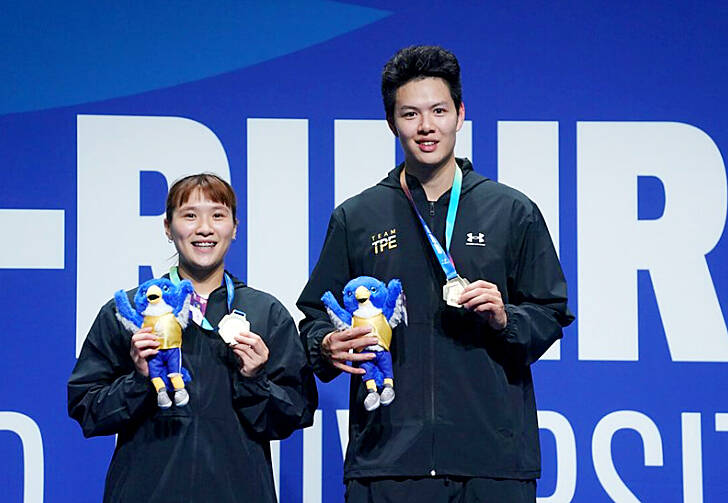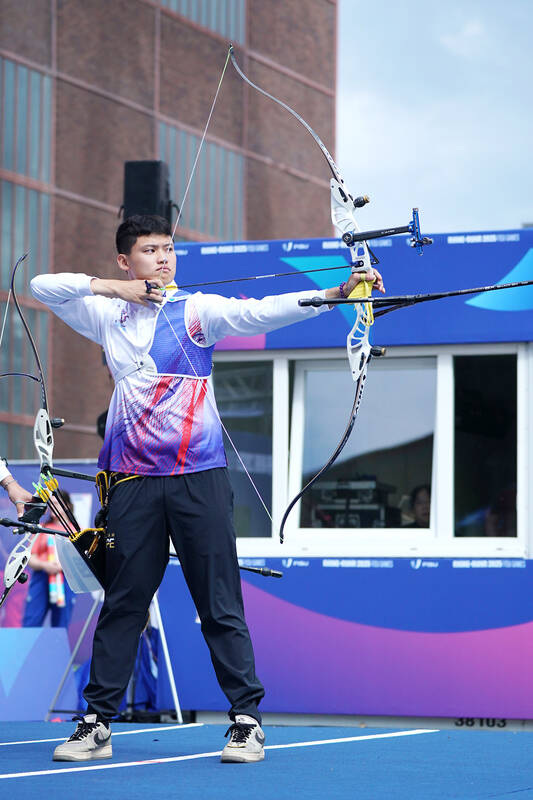Taiwan yesterday secured medals in multiple sports, including gold and silver in the mixed badminton doubles at the World University Games in Germany.
Wu Hsuan-yi and Yang Chu-yun defeated Chen Cheng-kuan and Hsu Yin-hui 2-0 at the mixed badminton finals in Mulheim an der Ruhr.
Wu and Yang won both games, with the first going 15-8 their way, followed by a much closer 17-15 win in the second to bag the gold.

Photo courtesy of the Chinese Taipei University Sports Federation
More Taiwanese badminton medals were up for grabs last night after press time as Jheng Yu-chieh and Sung Yu-hsuan were to face Chinese duo Li Qian and Wang Yiduo in the women’s doubles final, while Taiwanese Ting Yen-chen was to face Frenchman Enogat Roy in the men’s singles final.
In the archery events, Taiwan’s Tang Chih-chun secured gold in the men’s individual recurve yesterday, defeating Chinese Qin Wangyu in the final 5-6.
The match went to a tie-breaker after finishing five sets with a draw. Tang secured victory with a 10-point shot against Qin’s 8-pointer.

Photo grab from Student Sports Union(SSU) FB
Tang earlier in the day saw off Turkey’s Berkim Tumer in a resounding 6-0 win in the semi-finals.
With the victory, Tang, a two-time Olympian, ended Taiwan’s two-decade title drought in men’s individual recurve at the Universiade.
Taiwan’s previous gold in the event was won by Kuo Chen-wei in Izmir, Turkey, in 2005.

Photo: CNA
Taiwan’s women’s recurve archery team took silver on Friday after a 2-6 loss to Japan.
After a first-round bye, the team defeated Italy 5-4, India 5-1 and China 5-3 to advance to the gold medal match.
Taiwan took an early 2-0 lead after winning the first set 56-55 on Feng Yu-chu’s 10-point shot, but dropped the second set 54-56.
The final two sets were tough for Taiwan as wind and rain picked up during the third. Kuo Tzu-ying opened with a 10-point shot, but a surprising seven later in the set saw the team fall 52-58.
In the decisive fourth set, Taiwan opened with two eights and a seven, giving Japan an early edge. The match was sealed with a 52-56 finish.
Meanwhile, Taiwan’s men’s recurve archery team lost 0-6 to Turkey on Friday, finishing fourth.
The last and only time Taiwan’s women’s recurve team won gold at the Universiade was in 2015 in Gwangju, South Korea. One of the team members, Lin Shih-chia, returned this year as coach.
Elsewhere, Taiwanese-Swedish gymnast Tonya Helene Paulsson made history on Friday by winning bronze in the women’s all-around artistic gymnastics — Taiwan’s first-ever medal in sport at the event.
Born to a Swedish father and Taiwanese mother, 21-year-old Paulsson — a UC Berkeley student who also goes by her Chinese name, Chen Jui-an — chose to represent Taiwan in her World University Games debut.
In Friday’s final, which included vault, uneven bars, balance beam and floor exercise, Paulsson scored a total of 52.065 points to take bronze behind Japan’s Mana Okamura and Shoko Miyata.
In the men’s all-around final, Taiwanese gymnast Chuang Chia-lung placed 10th with a total score of 78.265, missing out on a podium finish.
Chuang, a student at Fu Jen Catholic University, was also making his debut at the World University Games.
Taiwanese tennis players Li Yu- yun and Lin Fang-an on Friday won a silver medal in the women’s tennis doubles after losing the finals to a Japanese duo in the German city of Essen.
Li Yu-yun and Lin Fang-an faced Oby Ange Kajuru and Kanon Yamaguchi of Japan in the finals, with each side winning a set before entering a super tiebreaker.
The Taiwanese duo opened the first-to-10 tiebreaker by winning the first three points, but their Japanese opponents ran off eight straight points of their own and eventually clinched the match 6-4, 4-6 (10-4).
The silver Li Yu-yun and Lin Fang-an won was the only medal won by Taiwanese players in the five tennis events they competed in at the Games.
The Games are to conclude today.

Right-wing political scientist Laura Fernandez on Sunday won Costa Rica’s presidential election by a landslide, after promising to crack down on rising violence linked to the cocaine trade. Fernandez’s nearest rival, economist Alvaro Ramos, conceded defeat as results showed the ruling party far exceeding the threshold of 40 percent needed to avoid a runoff. With 94 percent of polling stations counted, the political heir of outgoing Costa Rican President Rodrigo Chaves had captured 48.3 percent of the vote compared with Ramos’ 33.4 percent, the Supreme Electoral Tribunal said. As soon as the first results were announced, members of Fernandez’s Sovereign People’s Party

MORE RESPONSIBILITY: Draftees would be expected to fight alongside professional soldiers, likely requiring the transformation of some training brigades into combat units The armed forces are to start incorporating new conscripts into combined arms brigades this year to enhance combat readiness, the Executive Yuan’s latest policy report said. The new policy would affect Taiwanese men entering the military for their compulsory service, which was extended to one year under reforms by then-president Tsai Ing-wen (蔡英文) in 2022. The conscripts would be trained to operate machine guns, uncrewed aerial vehicles, anti-tank guided missile launchers and Stinger air defense systems, the report said, adding that the basic training would be lengthened to eight weeks. After basic training, conscripts would be sorted into infantry battalions that would take

GROWING AMBITIONS: The scale and tempo of the operations show that the Strait has become the core theater for China to expand its security interests, the report said Chinese military aircraft incursions around Taiwan have surged nearly 15-fold over the past five years, according to a report released yesterday by the Democratic Progressive Party’s (DPP) Department of China Affairs. Sorties in the Taiwan Strait were previously irregular, totaling 380 in 2020, but have since evolved into routine operations, the report showed. “This demonstrates that the Taiwan Strait has become both the starting point and testing ground for Beijing’s expansionist ambitions,” it said. Driven by military expansionism, China is systematically pursuing actions aimed at altering the regional “status quo,” the department said, adding that Taiwan represents the most critical link in China’s

EMERGING FIELDS: The Chinese president said that the two countries would explore cooperation in green technology, the digital economy and artificial intelligence Chinese President Xi Jinping (習近平) yesterday called for an “equal and orderly multipolar world” in the face of “unilateral bullying,” in an apparent jab at the US. Xi was speaking during talks in Beijing with Uruguayan President Yamandu Orsi, the first South American leader to visit China since US special forces captured then-Venezuelan president Nicolas Maduro last month — an operation that Beijing condemned as a violation of sovereignty. Orsi follows a slew of leaders to have visited China seeking to boost ties with the world’s second-largest economy to hedge against US President Donald Trump’s increasingly unpredictable administration. “The international situation is fraught